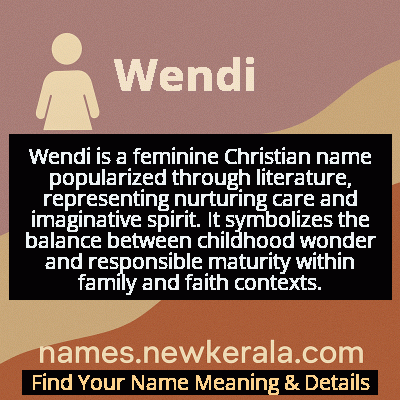Wendi Name Meaning & Details
Origin, Popularity, Numerology Analysis & Name Meaning of Wendi
Discover the origin, meaning, and cultural significance of the name WENDI. Delve into its historical roots and explore the lasting impact it has had on communities and traditions.
Name
Wendi
Gender
Female
Origin
Christian
Lucky Number
1
Meaning of the Name - Wendi
Wendi is a feminine Christian name popularized through literature, representing nurturing care and imaginative spirit. It symbolizes the balance between childhood wonder and responsible maturity within family and faith contexts.
Wendi - Complete Numerology Analysis
Your Numerology Number
Based on Pythagorean Numerology System
Ruling Planet
Sun
Positive Nature
Leaders, ambitious, highly driven, self-reliant, innovative.
Negative Traits
Overly aggressive, domineering, impatient, selfish.
Lucky Colours
Red, orange, gold.
Lucky Days
Sunday.
Lucky Stones
Ruby, garnet.
Harmony Numbers
2, 3, 9.
Best Suited Professions
Entrepreneurs, managers, engineers.
What People Like About You
Courage, determination, leadership.
Famous People Named Wendi
Wendy Carlos
Composer and Electronic Music Pioneer
Pioneered electronic music with Switched-On Bach and composed scores for A Clockwork Orange and Tron
Wendy Williams
Television Host and Media Personality
Hosted the nationally syndicated talk show The Wendy Williams Show for over a decade
Wendy Wasserstein
Playwright
Pulitzer Prize-winning playwright for The Heidi Chronicles and prominent feminist voice in American theater
Wendy Hiller
Actress
Academy Award-winning actress known for Pygmalion and Separate Tables with a career spanning six decades
Name Variations & International Equivalents
Click on blue names to explore their detailed meanings. Gray names with will be available soon.
Cultural & Historical Significance
The name's Christian associations developed later through its adoption by English-speaking Christian communities, where it came to symbolize innocence, protection, and the bridge between childhood and adulthood. In Christian naming traditions, Wendi represents virtues of caring stewardship and the importance of maintaining childlike faith while embracing mature responsibility. The name's journey from literary invention to accepted given name demonstrates how cultural artifacts can influence naming practices, creating new traditions that blend imaginative creation with spiritual meaning. This unique origin story makes Wendi a fascinating example of how literature can shape cultural identity and personal nomenclature.
Extended Personality Analysis
Individuals named Wendi are often perceived as nurturing and responsible, reflecting the original Wendy Darling's maternal qualities. They tend to be practical caregivers who maintain order while preserving a sense of wonder and imagination. This combination of reliability and creativity makes them excellent problem-solvers who can approach challenges from multiple perspectives. Wendis typically exhibit strong organizational skills paired with emotional intelligence, allowing them to care for others while pursuing their own dreams.
Their personality often balances traditional values with independent thinking, creating individuals who honor their roots while forging new paths. Many Wendis demonstrate resilience and adaptability, able to navigate between different social circles and responsibilities with grace. They often serve as the 'glue' in their relationships and communities, providing stability without sacrificing their unique perspective or sense of adventure. This dual nature - both grounded and imaginative - allows Wendis to excel in roles that require both practical management and creative vision, making them valued leaders, caregivers, and innovators in their chosen fields.
Modern Usage & Popularity
In contemporary usage, Wendi maintains moderate popularity as a distinctive yet familiar name. While it peaked in the 1960s-1970s following the Disney animated adaptation of Peter Pan, it has since settled into steady but less frequent use. The spelling 'Wendi' (with an 'i') is less common than the traditional 'Wendy' spelling, giving it a slightly more unique and modern feel. Current usage trends show it appealing to parents seeking names with literary heritage that aren't overly common. It's particularly popular among families with English or Christian backgrounds who appreciate its wholesome connotations and recognizable yet not overused quality. The name continues to be associated with warmth, reliability, and creativity, making it an enduring choice for parents valuing both tradition and individuality in an era where unique spellings of classic names are increasingly popular.
Symbolic & Spiritual Meanings
Symbolically, Wendi represents the bridge between childhood innocence and adult responsibility. The name embodies the concept of protective nurturing while maintaining the capacity for wonder and adventure. It symbolizes the guardian of imagination - someone who preserves magic in the practical world. In Christian contexts, it can represent the virtues of caring stewardship and faithful service, reflecting the maternal protection Wendy provides to the Lost Boys. The name also carries connotations of journey and return, mirroring Wendy's adventure to Neverland and her eventual return home wiser and more mature. It symbolizes the balance between duty and dreams, responsibility and freedom, making it a powerful representation of integrated feminine strength that honors both traditional caregiving roles and independent spirit while maintaining connections to literary heritage and cultural storytelling traditions.

